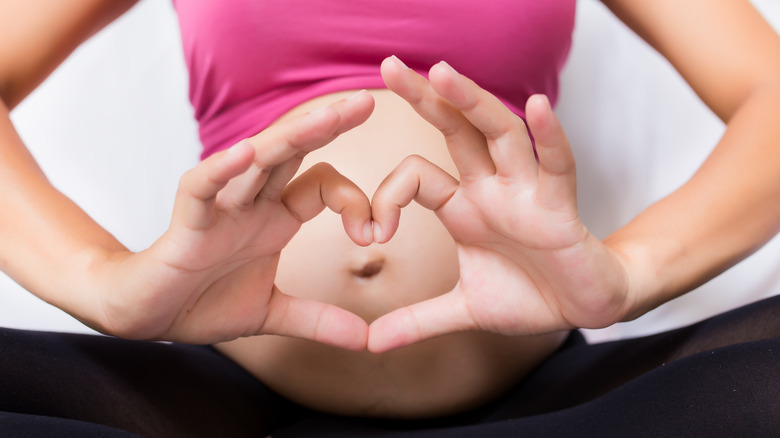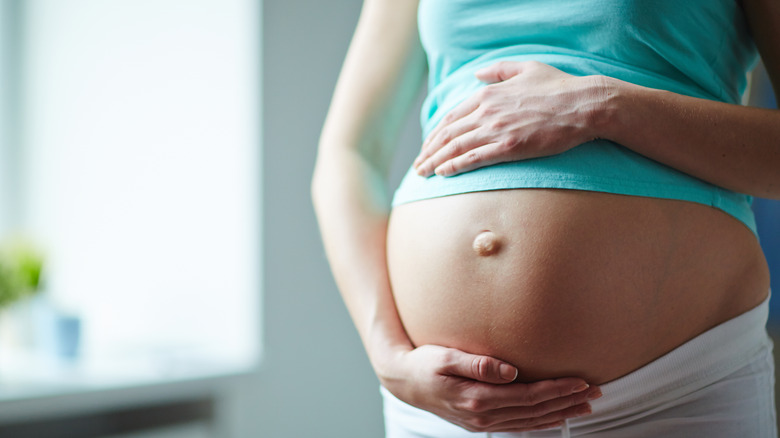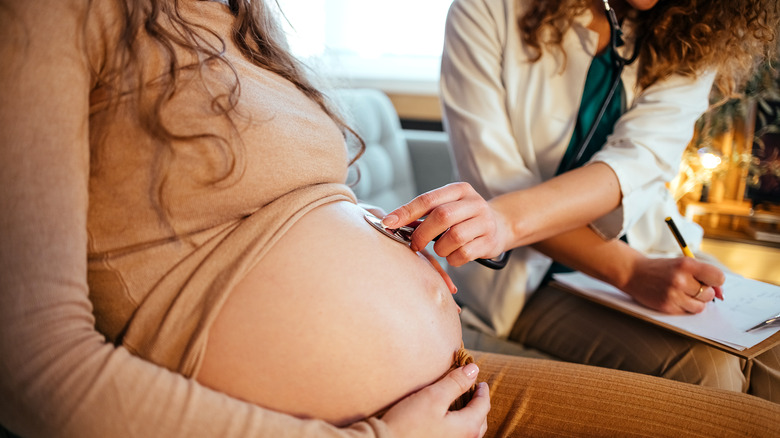Why Belly Buttons Can Pop Out During Pregnancy
If you've ever been pregnant or know someone who has been pregnant, you may have noticed the belly button protruding at a certain point and wondered why this might happen. Learning more about the development of belly buttons can help us understand this phenomenon.
On a day-to-day basis, we pay little attention to the seemingly random hole in our stomachs. When you really think about it, you start to question if there's any point to belly buttons besides collecting dirt or being an attractive spot for a piercing. According to ZME Science, belly buttons don't serve much of a purpose besides being a scar left behind from umbilical cord detachment after birth. Interestingly, we aren't alone in having a belly button, as many other mammals, and even birds and reptiles, share this characteristic.
The belly button stems from the umbilical cord, which is an organ connecting a mother to her baby starting at around 4 weeks of pregnancy, as described by BabyCenter. Among the three blood vessels in the umbilical cord, one transports nutrients from a mother to her baby, and the other two transfer waste from a baby to their mother for it to be disposed of.
The umbilical cord is removed after a baby is born, leaving a "belly button" scar. When a woman is in the midst of her pregnancy, her own belly button can pop out as her uterus expands to make room for her developing baby, as pointed out by MomLovesBest.
A protruding belly button is normal during pregnancy
Expectant mothers who suddenly notice their belly button changing will be happy to know that having their belly button pop out during pregnancy is completely normal. In most cases, the belly button pops out during the second or third trimester, or around the 26th week of pregnancy, as noted by MomLovesBest.
The belly button is pushed out as a fetus grows and develops. It happens when the expanding uterus presses against the stomach and stretches out the skin. Dr. Kelly Kasper, obstetrician-gynecologist and associate clinical professor at Indiana University School of Medicine, told TheBump about a joke regarding the belly button being a "turkey timer" that pops out when a baby is ready to be born. However, a protruding belly button doesn't happen to everyone during pregnancy, so there's no need to worry if your belly button remains the same.
A protruding belly button can become so prominent that it can be seen through your shirt, which can make some women self-conscious. Typically, the process of a belly button popping out shouldn't cause any pain, but a protruding belly button can become irritated when it rubs against clothing, as pointed out by TheBump. In this case, you can prevent irritation and discomfort by covering your belly button with a bandage. You can expect a pushed-out belly button to return to its natural state in the following months after giving birth, Dr. Michael Bermant of Bermant Plastic Surgery, told MomJunction.
A pushed-out belly button can sometimes be a sign of umbilical hernia
A protruding belly button during pregnancy is normal, but there are rarer cases where a belly button popping out may be a symptom of an umbilical hernia, as described by Healthline. After the umbilical cord connecting us to our mother is removed when we're born, the tunnel between our stomach muscles will typically close. However, someone can develop an umbilical hernia if this opening isn't closed properly.
During pregnancy, existing umbilical hernias can worsen and new ones can develop in response to an expanding uterus, according to Parents. While an ordinary pushed-out belly button during pregnancy is relatively painless, an umbilical hernia can be painful and sore, although some women may not show any symptoms. The hernia can become aggravated when sitting down or coughing. In some cases, it can grow to the size of a grapefruit.
Women who are overweight, have an existing umbilical hernia, weakened stomach muscles, or extra fluid in their stomachs are at an increased risk of an umbilical hernia during pregnancy. The average umbilical hernia won't harm a mother or her developing baby, but a severe hernia can twist the intestines, affect blood circulation, and contribute to digestive issues for an expectant mother. If the umbilical hernia is too large, a C-section delivery may be necessary, as noted by Pristyn Care. Laparoscopic surgery may also be required in cases where an umbilical hernia is causing damage to the intestines.



